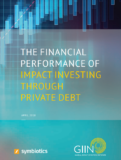Private debt or fixed income instruments comprise the largest asset class in impact investing, accounting for 34% of impact investors’ reported assets under management (AUM), according to the 2017 GIIN Annual Impact Investor Survey. A new report by the Global Impact Investing Network (GIIN) and Symbiotics, which analyzes the performance of impact investing through private debt, finds that private debt funds seeking positive impact can offer very stable returns across various risk-return strategies.
Amit Bouri, GIIN CEO says, “This report offers the most definitive evidence for private debt investors still not sure if impact investing is right for them.” He added, “Impact investments in private debt are an attractive option that can yield a stable return and drive capital toward powerful global progress.”
This is the first comprehensive industry report on the financial performance of impact investing through private debt. In addition to financial performance, it sheds light on the investment strategies, fund structures, and impact measurement practices of two types of funds: Private Debt Impact Funds (PDIF), investing primarily in emerging markets and Community Development Loan Funds (CDLF), investing exclusively in the United States.
Key highlights of the report:
- Both sets of funds studied offer stable returns. Weighted net returns of PDIFs averaged 2.6% per annum since 2012, with the 90th percentile registering 10% return in 2016. CDLFs paid an average of 2.9% on their notes, with the 90th percentile registering 3.6% return in 2016.
- PDIFs have a Sharpe ratio of 0.77, which compares favorably to other traditionally stable asset classes such as bonds or cash, and also offer an uncorrelated asset for portfolio diversification.
- Fixed income funds demonstrated extremely high portfolio quality overall, with average writeoff ratios in both sets of funds below 1%.
- Both types of funds seek impact through a range of themes, including financial inclusion, affordable housing, and employment generation, among others.
“Interest and activity in impact investing has grown rapidly in recent years. This has been aided by the growing body of evidence on financial performance, which has shown that impact investments can generate returns that are competitive with conventional investing,” says GIIN Research Director Abhilash Mudaliar. He added, “This report shows that the same is true in the private debt asset class. Continued investor willingness to share performance data will be essential to drive exponential industry growth and ensure the channeling of capital towards critical social and environmental challenges.”




